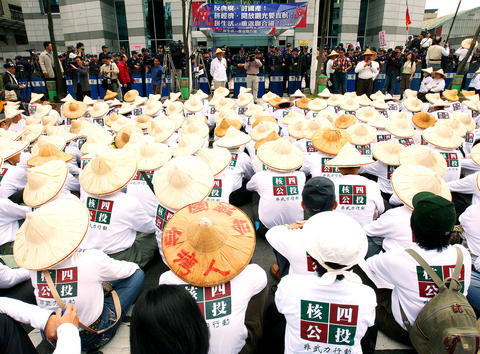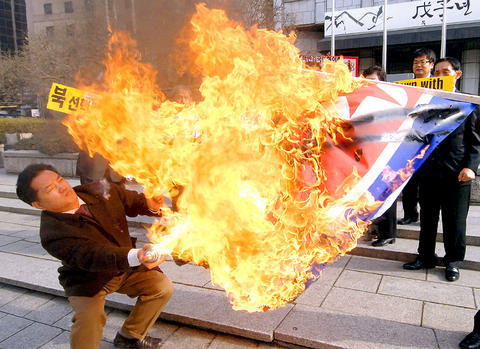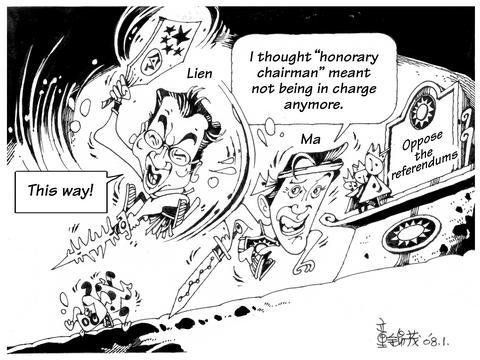James Huang reiterates China threat
'DELICATE STAGE': The minister of foreign affairs said communication with
Malawi had hit a rough patch since his visit to the African ally was suddenly
called off last week
By Shih Hsiu-chuan
STAFF REPORTER
Wednesday, Jan 09, 2008, Page 1
"It's going to be a very tough year in terms of making diplomatic
progress."-James Huang, minister of foreign affairs
Minister of Foreign Affairs James Huang (黃志芳) returned from Swaziland yesterday,
warning that China could use any of a series of major events to increase its
efforts to isolate Taiwan.
The nation needs to carry on with its efforts because Beijing will not stop its
fight to limit Taiwan's international space, Huang told a news conference at
Taiwan Taoyuan International Airport.
"It's going to be a very tough year in terms of making diplomatic progress,"
Huang said.
En route to Malawi last week,Huang made a last-minute detour to Swaziland when
Lilongwe informed him it could not receive him.
He said that Saturday's legislative elections, the presidential election on
March 22 and presidential inauguration on May 20, as well as the Olympic Games
in Beijing, were all opportunities during which China could try to press
Taiwan's diplomatic allies.
"China will not cease to restrict Taiwan's diplomatic space during the election
season. On the contrary, it will intensify its pressure during this period,"
Huang said.
The cancellation of Huang's visit to Malawi added fuel to weeks of speculation
that the country would sever its diplomatic ties with Taiwan in favor of China.
Huang said the relationship between Taiwan and Malawi was "at a sensitive and
delicate stage" and communication between the two countries had hit a rough
spot.
Huang said he called off his trip as per diplomatic protocol after Malawi said
that the visit would be inconvenient.
"I chose to respect Malawi's decision because I didn't want to put [senior
Malawian officials] in a difficult position," he said.
The Ministry of Foreign Affairs (MOFA) said on Friday Malawian Minister of
Foreign Affairs Joyce Banda had spoken to Huang on the phone during a flight
stopover and told Huang he would be invited to visit once government operations
returned to full speed after the holiday season.
Huang said he would visit Malawi whenever there was a convenient opportunity.
In related developments, a MOFA delegation left for the Marshall Islands
yesterday to consolidate ties with the ally, which has elected a new president,
Litokwa Tomeing.
Meanwhile, a group of former US officials, including former secretary of defense
William Perry, postponed a planned visit to Taiwan from next week until April.
MOFA Spokeswoman Phoebe Yeh (葉非比) said the ministry was in touch with the group
concerning the reason for the rescheduling of the trip.
The former US officials arranged the visit to learn more about Taiwan's
democracy, the latest developments in cross-strait relations and the effect of
the legislative elections on the political scene, the ministry said late last
month.
 |
| HAT SWARM Former Democratic Progressive Party chairman Lin I-hsiung and more than 400 members of the Nuke-4 Referendum Initiative Association gather in front of Chinese Nationalist Party (KMT) headquarters in Taipei yesterday to protest against the KMT's decision to boycott the upcoming referendums. PHOTO: CNA |
Advisers to Hsieh slam KMT taunt
GIVE US EVIDENCE:
A member of Hsieh's medical advisory team responded to KMT accusations that the
team had made an about-face in its allegiance
By
Ko Shu-ling and Mo Yan-chih
STAFF REPORTERS
Wednesday, Jan 09, 2008, Page 3
"I didn't know about [the alleged forged list] until I saw it in the
newspaper."-Ma Ying-jeou, KMT presidential candidate
Medical advisers to Democratic Progressive Party (DPP) presidential candidate
Frank Hsieh (謝長廷) yesterday fought back over the Chinese Nationalist Party's (KMT)
mocking of the advanced age of some of the candidate's advisers.
Janice Chen (陳昭姿), a member of Hsieh's advisory team, said it was regrettable to
see how politics had changed Steve Chan (詹啟賢), whose kind nature she said had
turned to bitter sarcasm.
Chen was referring to Chan's remarks describing Hsieh's medical advisers as
"gray-haired maids in an imperial palace."
Chan is former dean of Chi Mei Hospital and now a top aide of KMT presidential
candidate Ma Ying-jeou (馬英九).
Responding to the complaint that Hsieh had included medical professionals in his
advisory team without notifying the individuals concerned, Li Tzu-yao (李鎡堯), one
of Hsieh's medical advisers, challenged the KMT to substantiate its claim with
evidence.
Li also dismissed criticism that they had switched their political allegiance,
saying that national identification was a cardinal issue of right and wrong and
that they would not change their political views on a whim.
Li said that medical professionals have developed close relations with the
pan-green camp over the years.
At a separate setting yesterday, DPP Secretary-General Cho Jung-tai (卓榮泰) also
criticized the KMT for its "dirty tricks."
Cho was referring to the KMT allegedly adding names of overseas businesspeople
in the name list of Ma's New York support group without seeking their consent.
The Chinese-language Liberty Times (the Taipei Times' sister newspaper) said on
Monday that New York Taiwanese Businesspeople Association chairwoman Chang
Ya-feng (張亞鳳) had criticized Ma's camp for including her in Ma's list of New
York supporters without seeking her consent.
The KMT may have dismissed the incident as a mere mistake, but it made the
fabrication sound "so natural," Cho said yesterday.
In response to Hsieh camp accusations that the Ma camp had forged the list of
individuals in the medical support group and included foreign Taiwanese
businessmen in its list of supporters, Ma said yesterday that his camp would
look into the issue.
"I didn't know about it until I saw it in the newspaper," Ma said yesterday
while campaigning for KMT legislative candidates in Taoyuan County. "We are
looking into the issue and will give an explanation later."
Ma camp spokesman Luo Chih-chiang (羅智強) said that overseas support groups were
independently formed and operated by overseas Taiwanese and that the Ma campaign
office would ask the support groups to make corrections if there were mistakes
in the list.
While the Ma camp said it would look into the matter, the Overseas Ma Ying-jeou-Vincent
Siew (蕭萬長) support group posted an apology on its Web site (www.ma2008.org/index.php)
on Monday for mistakenly including directors of local Taiwanese businesspeople
groups as contractors for the support group.
Commenting on the establishment of Hsieh's medical personnel support group in
Taipei on Sunday and the camp's criticism against him for including medical
personnel in his support group without seeking their consent, Ma said he
understood the pressure put upon some people who offered support to both camps.
He did not elaborate.
China has contingency plans for N Korea: report
UNRULY NEIGHBOR: Beijing did not deny claims made in a report by US think
tanks that it had plans in place to send troops into North Korea to secure
nuclear weapons
AFP, WASHINGTON
Wednesday, Jan 09, 2008, Page 5
 |
| South Korean
protesters burn a North Korean flag during an anti-North Korea rally in
Seoul yesterday. US nuclear envoy Christopher Hill yesterday urged North
Korea to provide a complete account of its nuclear programs as he
arrived in South Korea to kick-start disarmament talks.
|
China has contingency plans to dispatch troops
into North Korea and secure nuclear weapons in the event of instability in the
hardline communist state, US experts who have talked to Chinese military
researchers said.
Any intervention by Beijing would be done as far as possible after consultations
with the UN, but unilateral action was not ruled out, the experts said in a
report published on the Web sites of two US think tanks.
"If deemed necessary, PLA troops would be dispatched into North Korea," the
report said, referring to the Chinese People's Liberation Army (PLA).
"China's strong preference is to receive formal authorization and coordinate
closely with the UN in such an endeavor," it said. "However, if the
international community did not react in a timely manner as the internal order
in North Korea deteriorated rapidly, China would seek to take the initiative in
restoring stability."
The report was compiled by experts from the Center for Strategic and
International Studies and the US Institute of Peace -- which published the
report -- and Asia Foundation following their visit to China in June last year.
A spokeswoman for China's foreign ministry yesterday said she was unaware of any
Chinese strategy to send troops into North Korea to secure nuclear weapons, but
did not outright deny that such a plan existed.
"I have never heard of nor seen the so-called plan mentioned in the report,"
Chinese Foreign Ministry spokeswoman Jiang Yu (姜瑜) told reporters in Beijing,
without commenting further.
North Korea, which reportedly has up to 10 nuclear bombs, is involved in a
denuclearization program in return for energy aid and diplomatic and security
guarantees under a six-party mechanism involving also the US, China, Russia,
South Korea and Japan.
The program hit a snag recently after Washington accused Pyongyang of not
meeting a Dec. 31 deadline for a full declaration of its nuclear programs.
"According to PLA researchers, contingency plans are in place for the PLA to
perform three possible missions" in North Korea -- humanitarian and peacekeeping
missions and "environmental control" measures, the report said.
The measures are intended "to clean up nuclear contamination resulting from a
strike on North Korean nuclear facilities" near the Sino-North Korean border and
"to secure nuclear weapons and fissile materials."
The report -- entitled "Keeping an Eye on an Unruly Neighbor: Chinese views of
economic reform and stability in North Korea" -- said that in the event of
instability in North Korea, China's main priority would be to prevent a flood of
refugees.
This would be done by assuring supplies of food and strengthening border
controls, it said.
"PLA officers maintain that they would attempt to close the border, but admit a
lack of confidence that they could do so successfully, since the border extends
866 miles [1,394km] and can be easily penetrated," the report said.
US experts took pains to emphasize that nuclear concern was only one part of the
US-China dialogue on North Korea issues among the think tank community.
"The range of issues discussed is comprehensive," Korea expert John Park of the
US Institute of Peace told reporters. "Discussion of hypothetical scenarios
enables various parties to achieve a better understanding of nuanced views."
China's overall concerns about instability in North Korea, including on the
nuclear issue, are not new as they share a long border, China expert Bonnie
Glaser of the Center for Strategic and International Studies said.
"Just as the US is concerned about the possibility of instability in terms of
nuclear weapons in Pakistan, the Chinese not surprisingly have concerns about
control and security of nuclear facilities and nuclear weapons in the event of
instability in North Korea," she said.
The US experts also discussed with Chinese specialists trends in North Korea's
economy and prospects for reform, trends in Sino-North Korean economic relations
and China's policy toward North Korea in the wake of Pyongyang's October 2006
nuclear weapons test.
"I think the most important thing that has come out of it has really been
increased understanding between experts on both sides about how we look at North
Korea," Glaser said.

US wrong on referendum
Wednesday, Jan 09, 2008, Page 8
Taiwan's plan to hold a referendum on joining the UN under the name of "Taiwan"
has challenged the US position on Taiwan's status.
American Institute in Taiwan (AIT) Chairman Ray Burghardt and AIT Director
Stephen Young, Deputy Assistant Secretary of State for East Asian Affairs Thomas
Christensen, Deputy Secretary of State John Negroponte and Secretary of State
Condoleezza Rice have criticized Taiwan's move.
The US has publicly opposed Taiwan's referendum, saying that Taiwan is
unilaterally changing the "status quo," destabilizing peace in the Taiwan Strait
and provoking China. The US opposition is baseless.
First, who defines the "status quo" on each side of the Taiwan Strait?
Second, President Chen Shui-bian (陳水扁) stated clearly during his New Year
address that over the past seven years the number of missiles deployed along
China's southeast coast aimed at Taiwan has increased fivefold, from 200 to over
1300.
Yet the US has done nothing against the Chinese military buildup against Taiwan
-- a unilateral change of the "status quo" in the Taiwan Strait, a "status quo"
that the US wants Taiwan to unilaterally adhere to.
Chinese military buildup clearly destabilizes the peace across the Taiwan
Strait.
Third, who would believe that conducting a referendum on entering the UN, an
internal affair about self-determination, is a provocative act to neighboring
countries?
A Zogby poll conducted last September concluded that the vast majority (81
percent) of Americans said the US should respect every country's right to UN
membership based on the principles of democracy and self-determination.
US opposition to the referendum goes against the basic American principles of
democracy and human rights. Washington is in a very awkward position. It is
joining hands with China, an authoritarian country, to suppress a democratic
state, Taiwan.
This is entirely contrary to the character and tradition of the US, a country
that has shed tears and blood to tirelessly promote democracy and liberty around
the world.
What the US has done has helped empower the communist Chinese establishment, not
stabilize the Taiwan Strait, with an unabashed attempt to deprive the Taiwanese
of their constitutional right to hold a referendum, just because the democracy
in Taiwan has become a serious threat to the survival of the regime in China.
This will backfire and threaten the stability and peace in the Far East. The
national security and interests of the US will be adversely affected as well.
US opposition to Taiwan's referendum on joining the UN is anti-democratic and
interferes with Taiwan's internal affairs.
It is time that Washington listens to the US people and adopts a "one China, one
Taiwan" policy.
It is time that Washington practices what it has been preaching by siding with a
democratic Taiwan, establishing formal US-Taiwan diplomatic relations and
supporting Taiwan's entry into the UN.
Gaines C. Ho
McLean, Virginia